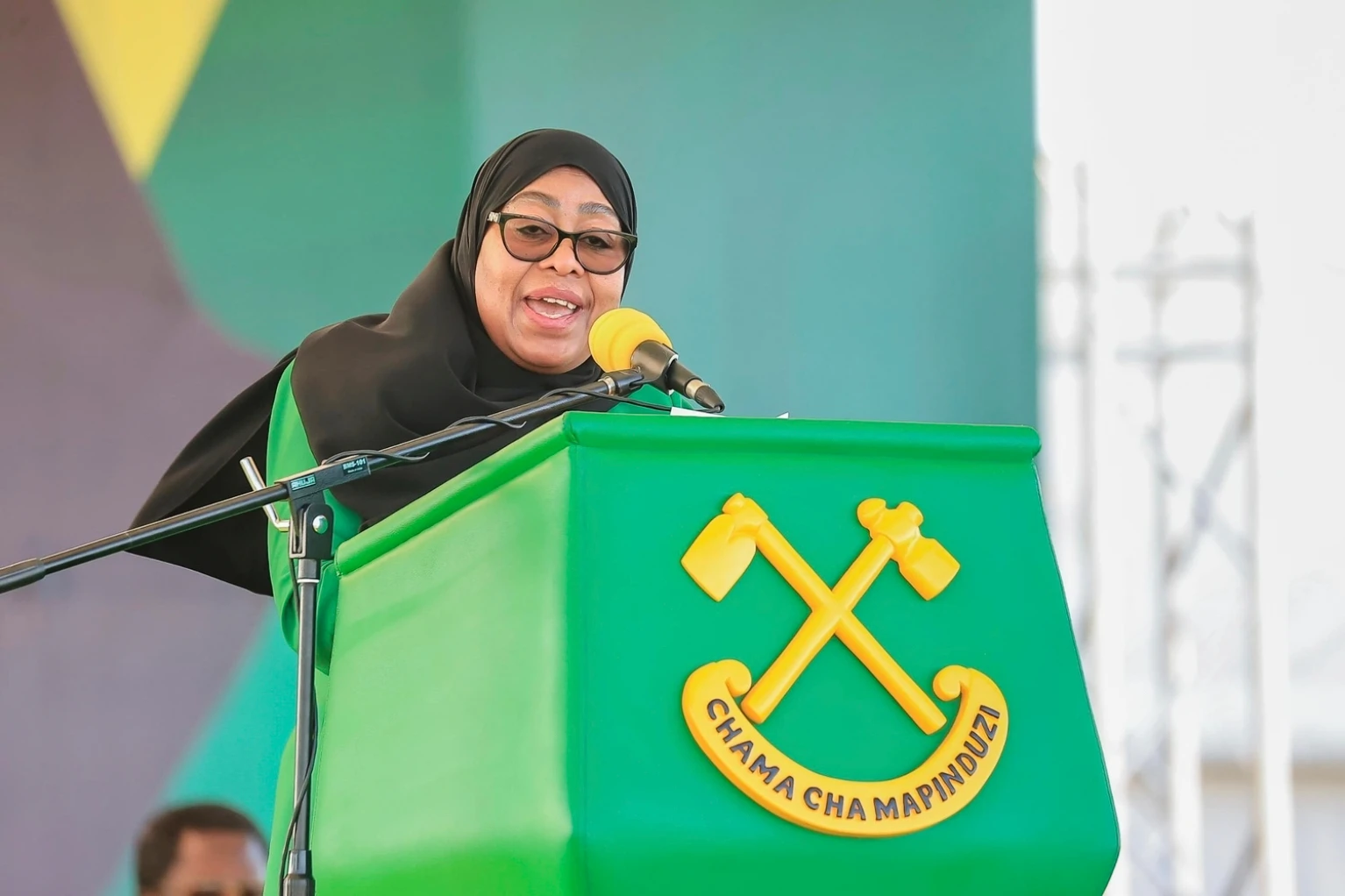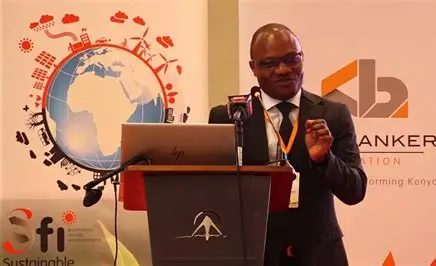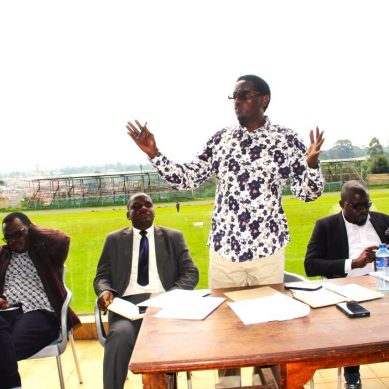
The displacement crisis in Sudan puts a huge strain on refugee camps.
In the North Darfur region of Sudan, famine has been confirmed by UNICEF and the Famine Review Committee (FRC) at one of the largest camps, Zamzam. UNICEF and the UN World Food Programme say that unless aid arrives in many affected regions, more than 700,000 children are projected to suffer severe acute malnutrition.
“This probably is by far one of the largest humanitarian crises that we have seen in the recent past,” says Noor. “Almost half of the population – so, one in every two people – that we come across is in need of humanitarian assistance. The kind of sexual and gender-based violence that we are also seeing in the country is absolutely unimaginable.”
Hafiz wears the red of Al Merrikh – one of Omdurman’s two big clubs – as he takes us on a tour around the Adre camp. It’s the only shirt he had when he was forced from his home in El Geneina.
“The atrocities in West Darfur state, killings, looting, beatings and tying people with ropes (have forced) people to walk long distances on foot,” he says. “The same level of suffering persisted upon reaching Adre camp. People here now have nothing but patience.
“We are living in uncertainty about what the future holds, here and in Sudan, where conditions are deteriorating. Life here is extremely challenging. There are orphans in the camp who lack shelter, food and water and they continue to suffer. People live in dire conditions and neither the elder overseeing the camp nor the organisations present have been able to help them.”
On April 15 last year, fighting began in Khartoum between the national army and the RSF. The night before, Mazin Abusin, head of development at the Sudan Football Association, had been playing football.
“It was Ramadhan and (the games) usually run after people break their fast in the evening. It was our usual annual competition,” he recalls.
“We woke up (the next day) and heard all the gunshots and the bombing. But the next day, things got worse. We used to say: if you’re lucky, you walk out with your passport, your phone and your life.”
Abusin took cover in Khartoum and Omdurman for two weeks, and then it was time to leave.
“That’s when it hit me,” he says. “I saw all the bodies. I saw dogs eating bodies. It was very scary. There were hundreds of bodies all over the street. There were tanks and cars abandoned by both armies. It was clear there had been a big battle.”
Abusin came to the UK with his family thanks to assistance from the British Army, which organised evacuation flights. He is determined to one day play the final of his football competition back in the same spot, partly to pay tributes to those he has lost – including El Rashid al-Hajj Amin Abdulgadir, a former player turned coach who helped children in poor communities.
One such boy was Abdul Aziz, who has muscular atrophy in his legs so moves around using his arms. He stitched up punctured footballs for Rashid to show his appreciation. “He taught me to play with my hands so I could get involved in street football,” Abdul says.
“(Rashid) had big dreams,” says Abusin. “When he lost his life, he was actually serving the community, (having) set up small kitchens in neighbourhoods to feed the people because of their inability to go and find food. It was targeted by a shell and he lost his life immediately.”
Football continues to be played by amateurs in areas designated as active war zones. “In my neighbourhood, I know at least three or four football grounds that have been used as burial grounds,” says Abusin. “As we speak now, people continue to play even though there’s a risk of shelling.”
Former Al Merrikh and Sudan international Adil Amin Awadallah leads one of the groups.
“We continue to play despite the war and all its related threats,” Awadallah says. “The main threat here is being caught in the crossfire. The worst experience for all the residents of the locality here is the random shelling that continues day and night.”
On a dusty pitch in the Karari district of Omdurman, people gather to play and watch an initiative known as Resilience Through Football.
“Sports in general are always a safe haven for all, but football has an exceptional role, as the people of Omdurman are very passionate about the game,” says Awadallah. “Young and old players gather week in, week out here to enjoy a challenge from other localities.”
They have been keeping tabs on the national team’s exploits too: “They are the only source of happiness the Sudanese people have at the moment. We wish them all the success; we are very proud of them.”
Many parts of Khartoum and Omdurman, two cities separated by the River Nile, are in ruins. The latter is home to both of the nation’s football teams, Al Hilal and Al Merrikh, whose grounds are just a few hundred metres apart.
The majority of the Sudan team are on the books of one or the other of the two clubs. Captain Agab and goalkeeper Mohamed Mustafa represent Al Merrikh, while the nation’s top scorer Mohamed Abdulrahman – who scored the clincher against Ghana – and key midfielder Waliedin Khedr – nicknamed Pogba, as he is said to play like France’s 2018 World Cup winner Paul – are Al Hilal players. Like the national team, they are currently playing their football outside Sudan, having temporarily joined sides in the Mauritanian league.
“That city breathes football,” says Koteba Fareed, who works closely with the Sudan FA, of Omdurman.
Abdulsalam left Sudan aged 15, before this war, travelling first to Libya, then 400 miles across the Mediterranean Sea to Italy.
“There were 140 of us on the boat,” he says, “and when (the authorities) came to save us – amid big sea and waves – and take some onto another boat, we watched four people die in front of us, there was nothing we could do.”
From Italy, he walked to France, then into Belgium, sleeping rough along the way, before it was time to try to get to England – spending 20 hours under a truck, via road back into France and then on a Calais to Dover ferry.
“I went with two of my friends under a big truck with just the road underneath me, it was really dangerous,” he says. “I could see a big moving part of the truck and knew if my shoelace got stuck I would just turn with the wheel and be finished in a second.”
In the UK, he was helped by authorities and the charity Fair Shot, which uses football to unite and – educate communities in the UK about the issues faced by those seeking asylum. They visit clubs – some near areas that saw anti-immigration protests back in the summer – and organise games with locals.
Daniel, a Rotherham United fan, was one of the players that Abdulsalam played alongside.
“It’s important to show that it really is a town built on community and everyone’s welcome,” Daniel says. “Sometimes it’s hard to get that message across, but (these games can) prove we (can be) welcoming.”
In so many ways, football is helping the healing process.
- The Athletic report








